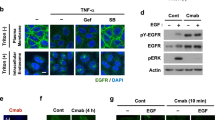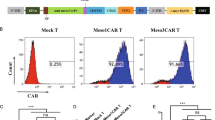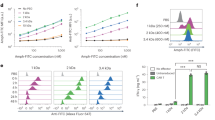Abstract
Specific gene transfer into targeted tumor cells remains a critical issue for the development of systemic gene therapy protocols. With this end in view, we have tested the possibility of selectively directing genes to tumor cells through the recognition of tumor-associated antigens (TAA). This was approached in vitro on four human renal cell carcinoma (RCC) lines by means of the highly specific mouse G250 monoclonal antibody (mAb) chemically conjugated to a plasmid DNA conveying a reporter activity. This mAb directed to a TAA that is present on 95% of primary RCCs and on 60% of metastatic human RCCs was extensively characterized, including during clinical trials. Epifluorescence microscopy analysis indicated that upon specific binding to G250 TAA, G250 mAb alone or conjugated to plasmid DNA was internalized by an active endocytic process and colocalized with the transferrin concentrated in the late recycling perinuclear compartment. We also observed that both unconjugated G250 mAb or G250 mAb conjugated to plasmid DNA remained in the perinuclear region of the cells for ≥20 hours and were not rapidly translocated to lysosomes or recycled to the plasma membrane. In contrast, unconjugated plasmid DNA was not internalized. After transfection of G250 TAA-positive RCC lines with G250 mAb conjugated to a plasmid cDNA encoding mouse interleukin-2, a significant and sustained production of mouse interleukin-2 protein was detected from days 5–15 and was abrogated by inhibiting the internalization process. Altogether, our data showed that endocytosis of G250 TAA should be the basis of gene transfer to RCC, suggesting that targeting of TAA capable of internalization may be the basis of new approaches for designing alternative cancer gene therapy procedures.
This is a preview of subscription content, access via your institution
Access options
Subscribe to this journal
Receive 12 print issues and online access
$259.00 per year
only $21.58 per issue
Buy this article
- Purchase on Springer Link
- Instant access to full article PDF
Prices may be subject to local taxes which are calculated during checkout
Similar content being viewed by others
Author information
Authors and Affiliations
Corresponding author
Rights and permissions
About this article
Cite this article
Dürrbach, A., Angevin, E., Poncet, P. et al. Antibody-mediated endocytosis of G250 tumor-associated antigen allows targeted gene transfer to human renal cell carcinoma in vitro. Cancer Gene Ther 6, 564–571 (1999). https://doi.org/10.1038/sj.cgt.7700085
Received:
Accepted:
Published:
Issue Date:
DOI: https://doi.org/10.1038/sj.cgt.7700085
Keywords
This article is cited by
-
Chemosensitization by erythropoietin through inhibition of the NF-κB rescue pathway
Oncogene (2005)
-
Character of tumor associated protein recognized by monoclonal antibody against Yunnan gejiu lung cancer
Chinese Journal of Cancer Research (2000)



